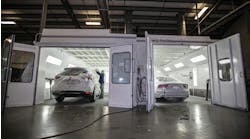Service Contracts Grow in Popularity as New Cars Become More Expensive to Repair
As new cars make their debut on the nation’s biggest car sales weekend of the year, more buyers than ever before will decide to purchase a service contract to cover the cost to repair their new ride.
Like this article? Sign up for our enews blasts here.
Service contracts are an increasingly popular choice among consumers as car repair costs rise, according to the Service Contract Industry Council (SCIC).
The SCIC estimates that consumers bought more than 10 million service contracts in 2012 for both new and used vehicles. Those service contracts covered 95 percent of annual claims filed, including repairs necessary due to normal wear and tear, providing coverage above and beyond a traditional manufacturer’s warranty.
Today’s vehicles are made up of more than 10,000 components, yet the standard powertrain warranty covers only a fraction of them. The average new car has six to 20 computers that control everything from fuel injection and anti-lock brakes to airbag deployment. Those systems can be expensive to repair, due to both the high cost of parts and labor costs that can run as high as $250 an hour for specialized repairs on luxury vehicles.
Service contracts (sometimes called extended warranties) offer value and predictability by protecting a vehicle long after the manufacturer’s warranty expires and by covering repairs it does not cover, said Timothy Meenan, SCIC executive director.
“The new technologies and complex components in today’s motor vehicles put consumers at greater risk for big out-of-pocket repair costs than ever before,” said Meenan, whose organization represents service contract providers covering home, auto and consumer goods. “Service contracts help consumers better deal with the unexpected, so they don’t have to worry when expensive unforeseen repairs are needed.”
In addition to valuable protection offered during a manufacturer’s limited warranty, vehicle owners rely on service contracts to pick up after the limited warranty expires, typically after three years or 36,000 miles, to cover essential yet costly-to-repair systems not covered by the manufacturer's powertrain warranty, such as air conditioning, power windows, electronics and navigation.
As an added benefit, most service contracts pay for the cost of a rental car while the car is in the shop, which the standard manufacturer’s warranty typically does not cover. In addition, service contracts can usually be transferred to a new owner when the vehicle is sold increasing the vehicle’s marketability.
The SCIC offers consumer tips on buying and using extended warranties or service contracts at: http://www.go-scic.com/.
Subscribe to Motor Age and receive articles like this every month…absolutely free. Click here




